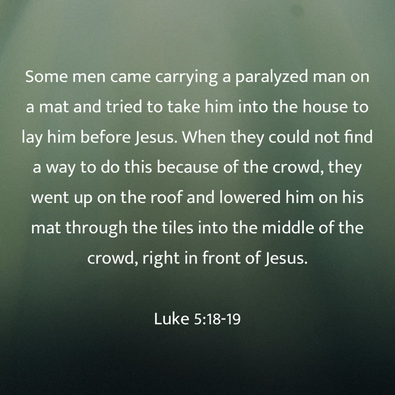|
Good morning! We're so happy you've decided to join us today, whether you're at home or at the church. When we meet in person, we share our joys and concerns together. If you are at home, take some time to think about your week, and the prayer requests you might have. You can share these in the comments as you feel comfortable. When you are ready, you can use the prayer below to get started (source). Almighty and eternal God, by your Holy Spirit you have revealed to us the gospel of your Son, Christ Jesus. Awaken our hearts that we may sincerely receive your Word and not make light of it, or hear it without fruit as did your people long ago. Instead lead us to fear you and daily grow in faith in your mercy and finally through your Son Christ Jesus, obtain eternal salvation; through your Son, Jesus Christ our Lord, who lives and reigns with you and the Holy Spirit, one true God, now and forever. This week's lesson is on Romans 4:1-12. During Paul’s ministry, a key issue concerned the role of the Jewish law for Christians who were not of Jewish descent. At the time Paul wrote this letter to the Romans, the famous Jerusalem Council had already recognized that the Gentiles would be welcomed into the Church without being required to keep the Law of Moses. This included forgoing circumcision, which symbolized the entire law for Jews. Circumcision was perhaps the most honored of all Jewish traditions. The rite began with Abraham, the forefather of the entire nation of Israel. Jewish men had proudly borne the mark of circumcision for hundreds of years, a physical sign of their separation from Gentiles. The traditional adversaries of Israel were called uncircumcised, an epic spit out with scorn. Any foreigner who wanted to be accepted had to be circumcised. To be an uncircumcised Jewish man was to be expelled from Israel and thus not part of the nation. Gentiles did not welcome the idea of circumcision as a condition for worshiping God. It was very painful. In the Roman world, this hesitation results in Gentiles who were attracted to Judaism to be identified as “God -fearing “ in contrast with converted fully. The God-fearing chose to honor the Lord. However, they were excluded from full participation in the temple or synagogue because the men in these families had not undergone circumcision. Peter’s encounter with Cornelius, during which time the Holy Spirit came to the group of Gentiles, was the beginning of a new understanding about what would not be required of the church. In part, the discussion of what Jewish customs to retain in the church-and required of Gentiles- was a discussion about the relationship between faith and works. Most Christians understand that works flow out of faith. We are saved through faith, not by works. The work we do for Christ is faith manifesting itself in our lives it is not an attempt to save ourselves. Paul’s discussion of Abraham considered in our lesson today is an example of this fact. Abraham had a incredible relationship with God. He trusted God even when called to journey to a place he had never seen, on the eastern end of the Mediterranean Sea. Later, Abraham trusted God to provide him with a legitimate heir when both he and his wife were advanced in age. For these and other acts , Abraham is considered the father of faith. He was the first to model a faithful relationship with God. Did Abraham earn justification through his acts of obedience, his works ? To be justified by God can never be the result of our works, for we have too many debits in the form of sins. If we really earned what we deserve based on our works, we would all remain dead in sins since “the wages of sin is death “. David came to know the blessing of forgiven sin, the essence of justification. David understood the grace of God as powerful to overcome the guilt of sins. David says happiness is found in God’s forgiveness. Is this blessedness only for the circumcised ? Abraham was already reckoned as righteous because of his faith in God. Abraham’s faith was credited to him as righteous before the sign of circumcision was implemented. Thus the sign of circumcision was of less importance than the faith behind it. This fact was important in affirming that circumcision was not necessary for the faith of Gentiles to be valid in following Christ. Outward obedience to God’s rules and regulations does not make a person righteous. Only one’s faith and God’s grace can result in being reckoned as righteous. Following his commands is a sign of our faith, without that faith, the signs are meaningless. Conclusion: Faith and Work How far do you allow your faith to take you? Do your actions show that your trust in God can overcome doubts and allow you to be obedient to him? Our faith leads us to entrust our children to God, no matter the circumstances. It guides us to worship God, not money, and to act accordingly to that sole allegiance. Faith requires us to live everyday in trust of God and his plan. So again, how far do you allow your faith to take you? Prayer Father, may we live daily as people whose faith results in unconditional trust in you. In Jesus name we pray. Amen Benediction This week's benediction is from the Good News Translation. Next week's lesson will be on Romans 5:1-11.
0 Comments
Leave a Reply. |
AuthorWe are a small, rural Presbyterian church in southwestern Pennsylvania. Archives
July 2024
Categories
All
|



 RSS Feed
RSS Feed